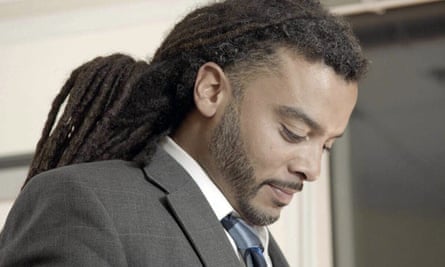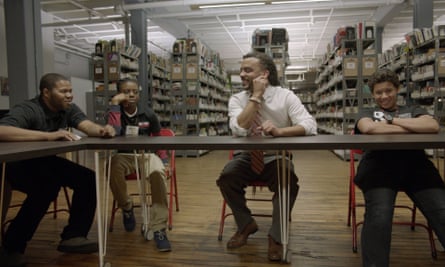Adam Foss doesn’t look like your average prosecutor. He wears his hair in long dreadlocks that flow down to his ankles, and beaded bracelets ornate his wrists. He spent eight years as an assistant district attorney in Boston, but rather than focusing on high conviction rates or projecting a “tough on crime” attitude, he has been far more interested in alternatives to incarceration, and on keeping juvenile offenders out of prison.
Foss’s efforts might have ended there, making tweaks on the fringes of a flawed system, but in 2015, he met singer John Legend, who is no stranger to activism. Now the two want to change the way prosecutors nationwide think about their job, and to recruit them into the war against mass incarceration.
“We are sending in droves our young men into a system that erases them from public view and public consideration,” Legend told the Guardian. “The only way we are going to slow that down is if we focus on holistic criminal justice reform and so much of that happens in the prosecutor’s office.”
The singer and songwriter spent much of last year on a tour of prisons around the country, visiting nine of them and sometimes performing for inmates. Through his organization Free America, Legend has been trying to bring attention to the over two million Americans in prison in order to change what he calls the “misguided” criminal justice policies leading to America having the largest prison population in the world.

Legend said he wasn’t surprised by much of what he saw in the prisons, but was definitely disturbed.
“You begin to realize how much trauma and pain and abuse [the inmates] have been victims of themselves before they got to prison, and since they’ve been in prison. And you realize that it’s just a cycle that keeps repeating.”
When Legend’s Free America hosted a gathering for progressive prosecutors in 2015, Foss was there, and it was there his vision for a new organization, now named Prosecutor Integrity was born. Foss wants to use the platform not just to apply political pressure, but to train the nation’s prosecutors, especially young ones, on how to rethink the application of justice.
“We’re always poking at the prisons and sentencing laws and police practices – and all of those things are important and need to be addressed, but the one lever that hasn’t really been addressed and will push everything over the edge is this one,” Foss said.
Prosecutors in the US wield unrivaled influence over the incarceration of alleged criminals. They alone choose what to charge, what deals to make and in all but a few jurisdictions, these decisions are not subject to any oversight or guidelines beyond the elections that put them into office.
And because plea bargains are carried out away from the public eye, voters often have very few insights into how those offices work – at least until something goes wrong. In the words of Angela J Davis, a law professor at American University: “The unchecked discretion of prosecutors is extraordinary, and the mechanisms of accountability we have don’t work.”
Foss, who was born in Colombia and adopted by a Boston law-enforcement family, left the Suffolk County DA’s office in March to focus on his new PI organization full-time. But while he was there, Foss tried to address that accountability gap with his own creative solutions.
“What I was trying to do is look at each individual defendant as a case study. My first inclination was: ‘Can I keep you out of the criminal justice system all together?’ And if I couldn’t do that, how could I make it work both for you and for the the victim, the community and me?”
In most large jurisdictions like Suffolk County, which encompasses the city of Boston, district attorneys have dozens or even hundreds of assistant DAs (ADAs) who handle the day to day details and decisions around cases. The DA himself may set priorities and policies for their staff to follow, but ADAs often have some latitude to affect justice however they see fit. These are the people Foss, Legend and Prosecutor Integrity want to reach and train to think more creatively about justice and the impacts of their decisions.
In a TEDx talk Foss delivered in March, he describes a case from early in his career as an ADA involving an 18-year-old black man he calls “Christopher”, arrested for stealing 25 laptops from a Best Buy and selling them on the internet. Foss explained he decided not to charge the teenager because he “didn’t think branding him a felon for the rest of his life was the right answer.
“With a criminal record and without a job, Christopher would be unable to find employment, education or stable housing. Without those protective factors in his life, Christopher would be more likely to commit further, more serious crime,” Foss said. “It is a terrible public safety outcome for the rest of us.”
Instead, Foss helped him recover most the sold computers, and come up with a plan to pay for the ones they couldn’t recover. He did community service and wrote about the impact of his actions. Six years later, Foss said, he encountered the young man again, and learned he had graduated from college and went on to become a manager at a Boston bank “and making a lot more money than me”, Foss quipped.
Foss doesn’t think his approach is particularly novel, either. “I’m not this person that’s come up with this crazy idea – this is what we’re supposed to be doing,” Foss said.
Largely thanks to the rise of the Black Lives Matter movement, the wind is now at Foss’s back. Enraged over prosecutor decisions in the police shooting deaths of Laquan McDonald and Tamir Rice, a popular groundswell led by activists pushed district attorneys out of office in Chicago and Cleveland during elections in March.
“These police killings of unarmed people is what’s making people pay attention to prosecutors, but in reality what they’re doing on a day to day basis and for so long is prosecuting ordinary citizens in ways that produce all kinds of injustices,” Davis said.
Davis wrote the book Arbitrary Justice about the under-appreciated unilateral power of prosecutors nearly a decade ago and she is encouraged to see public attention shifting, but worries that the big city changeovers earlier this year speak more to a reactiveness over police killings than a popular movement committed to changing the day to day behavior of DAs.
“Every single one of those 1,000-plus deaths last year was a tragedy,” Foss said, referring to those shot by police forces. “But if you think about the number of lives that are ruined by prosecutors, it’s some exponent of the number of people killed by police and we don’t get angry about that.”

According to Fordham law professor and researcher John Pfaff, prosecutors represent “a great untapped resource” for slowing prison admissions, and it’s not just theory. Pfaff said it can be readily demonstrated at work in New York and New Jersey, two states that have been decarcerating steadily for more than 15 years.
Since 2000, the two states have each decreased their prison populations by nearly 25%, according to Department of Justice data. They are two of only three states, the other being California, to see double-digit drops in incarceration over that span. By comparison, 45 states have actually increased their prison rolls over that time.
The rise in incarceration started “as the states were adopting tougher sentencing laws”, Pfaff said. “Lots of other states saw decreases in crime, and didn’t stop incarcerating. It’s clearly a decision on the part of DAs.”
The biggest challenge Foss is likely to face, beyond the inertia of the status quo, is fear. Voters have for decades stocked their districts with tough-on-crime prosecutors mainly because of it: the fear that criminals are out to hurt them, and the belief that locking them in cages is the only way to keep their communities safe.
If new prosecutors come into office on a platform of compassion and diversion, how does the public react to what Foss calls “the one-off” scenario where a diverted defendant commits a crime, especially a heinous or high-profile one?
“The truth is, the one-off happens every day in jail and yet no one says we should stop sending people to jail,” Foss said. Indeed, 95% of all inmates will leave prison at some point, allegedly rehabilitated, and some percentage of them, as many as 75% according to figures from the National Institute of Justice, will be arrested again.
“I’ll give you this: what I’m trying to do is different,” Foss said. “But is it any more dangerous than something we already know doesn’t work?”

Comments (…)
Sign in or create your Guardian account to join the discussion